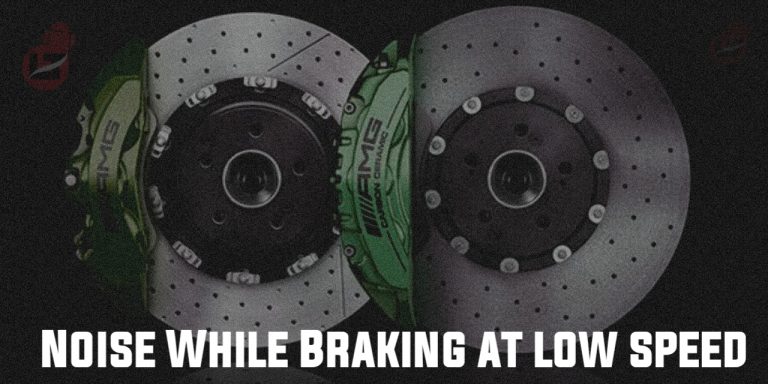If you’re curious about why your brakes make noise when braking at low speeds, you’ve come to the right place.
Brakes are one of the most critical components of any vehicle, and it’s crucial to address any engine problems that can lead to brake problems, as they are crucial in determining how well your car stops.
If you notice any unusual sounds or noises while driving, they are often the first sign of a problem with your car’s brakes. So, what does it mean when you hear grinding, squealing, and scraping noises or feel a vibration when braking?
It simply means that there’s likely a problem with your brakes that needs to be addressed immediately.
Common Causes of Grinding Noise & Vibration When Braking
There are several causes of noise when braking at low speed.
1. Bad Quality Brake Pads
Investing in high-quality brake pads is a crucial aspect of vehicle maintenance that should not be overlooked. Cutting corners by opting for cheaper options may seem like a cost-effective solution, but it can result in serious safety risks and damage to the vehicle. Therefore, buying brake pads from reputable stores that offer high-quality products is essential.
Cheap brake pads are often made from inferior materials that compromise their durability and performance. They may also contain defects like metal chunks that can scratch the rotor, damaging the vehicle’s braking system.
To ensure maximum safety and longevity for your vehicle, it is recommended to opt for high-quality brake pads from reputable brands such as Akebono, Stoptech, Wagner, EBC, Powerstop, and AC Delco. Though they may be more expensive than their cheap counterparts, the investment in high-quality brake pads will pay off in the long run with better performance, durability, and safety.
2. Worn Brake Pads
If you hear a grinding sound when you press the brake pedal, it may indicate that your brake pads have worn out. As the material on the backing plate wears away, it can cause metal-to-metal contact with the rotor.
If the worn brake pads are not replaced promptly, they can cause damage to your braking system. The rotor can get grooves or even be destroyed by the backing plate, and the caliper can also be damaged. This is why it’s crucial to replace your brake pads as soon as you notice any signs of wear to prevent further damage to your vehicle.
3. Debris Stuck in Brakes
When driving, your brake system can accumulate debris from outside sources, such as pieces of rock or gravel that can get stuck in the caliper, causing damage. When debris gets lodged between the rotor and caliper, it can lead to scraping or grinding noises and vibrations, even without applying pressure to the brake pedal.
If left unaddressed, the lodged debris can damage the rotor, which may require replacement. Additionally, foreign objects in your brakes can cause the brake pads to become misaligned, leading to uneven pad wear that reduces overall brake performance.
4. Infrequent Driving
The lifespan of brake pads generally ranges from 30,000 to 70,000 miles, depending on your vehicle type and driving style. If you encounter braking issues before reaching this range, it could indicate your car is not being driven enough.
If you store your car for an extended period, rust may form on the rotors and other brake components. This can cause calipers to stick and affect the smoothness of the rotor’s surface, resulting in unpleasant noises during driving or braking.
To prevent this problem, ensure you don’t store your car for too long and drive it at least twice a week. Regular cleaning can also help prevent rust formation in any part of your vehicle. If you notice any rust, it’s essential to address it promptly to avoid further damage.
5. Worn Brake Rotors
If your brake rotors are in bad condition, whether gouged, cracked, or warped, they will produce unusual and unpleasant sounds. Rotors that are not flat or are warped can lead to a squealing or squeaking noises, while worn rotors can cause scraping sounds.
Moreover, faulty rotors can also cause vibrations from the braking system. These vibrations can manifest in different patterns and be felt through the brake pedal or the steering wheel.
In some cases, if the rotors are only slightly warped, they can be resurfaced or turned to correct the issue. However, if the rotors have exceeded their lifespan, you should replace them immediately.
6. Worn Shims
Replacing the shims every time you get a brake job done or replacing your brake pads yourself is essential. Some unprofessional mechanics may skip this step to save time, but it is necessary to replace them.
Regularly replacing brake shims is crucial because they may wear down over time. This can lead to a part of the brake shim coming into contact with the rotor or other metal parts of the car brake.
When metal components touch each other like this, it can cause unpleasant sounds from your braking system while driving. Therefore, it is necessary to replace the shims to prevent such issues.
As an Amazon Service LLC Program Associate, V. Auto Basics earns from qualifying purchases. See Our Affiliate disclaimer.
